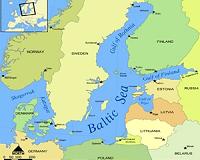| . |  |
. |
Moscow (AFP) July 26, 2010 Inhabitants of Moscow gasped in a sizzling heatwave Monday as the Russian capital saw its highest recorded temperature ever and was blanketed in a heavy cloud of smog from forest and peat fires. The mercury rose to 37.2 degrees Celsius (99 degrees Fahrenheit) by 1200 GMT, easily beating the previous record of 36.8 degrees from July, 1920, the Moscow Weather Office told Russian news agencies. Records started being kept 130 years ago, the Interfax news agency said. The spires of the city's famous Stalin-era skyscrapers were barely visible behind the curtain of fog in the early morning hours as the authorities sent in water-bombing aircraft to attack the fires in the Moscow region. The air in the city centre reeked of smoke all day long with the towers of the Kremlin and the golden domes of its churches mysteriously veiled in an envelope of grey smog when viewed from the other side of the Moscow river. Over the last 24 hours, firefighters have been battling 60 forest and peat fires covering a total area of 59 hectares, the emergencies ministry said in a statement. Planes from the emergencies ministry, including two giant Ilyushin-76 aircraft, had dropped 550 tonnes of water to douse the fires over the last 24 hours, it said. Some 21 peat fires were still burning in the Moscow region covering a total area of 17 hectares. Alexei Popikov, the head of local environment watchdog Mosekomonitoring, told Interfax that the concentration of toxic particles in the air exceeded the norm by 5-8 times. Russia's chief general doctor Alexander Chuchalin advised Muscovites to stay inside "with closed windows" and warned of an increase in illnesses, with those with bronchial problems particularly at risk, RIA Novosti reported. He said wearing anti-pollution masks was advisable outside, so long as people could tolerate wearing them in the heat. Alexei Yaroshenko, head of the forest programme for Greenpeace Russia warned starkly that "Moscow would be breathing smoke" for the next two months, Interfax said. "Even if the wind direction changes, you cannot say that it will get better in Moscow because the peat is burning in all the regions around Moscow," he added. Visibility on Moscow's roads in the morning was no more than 500 metres but airports carried on working normally. The Russian capital and much of the country from the Baltic to the Pacific coasts have been sweltering in the severest heatwave for decades which has destroyed 20 percent of all of Russia's arable land. The onslaught has alarmed a country better known for its bitterly cold winters, with Russians now eagerly awaiting the reappearance of the sub-zero temperatures to which they are better accustomed. "Uggh! You can't breathe! People are trying to close their windows but that smoke gets through all the cracks," complained the mass-circulation Komosomolskaya Pravda daily. The heatwave has claimed hundreds of lives of people who drowned in an attempt to cool off from the record temperatures. The horrific toll has been blamed on drunkenness and the use of poorly equipped beaches. This weekend alone, 65 people drowned in Russia, Interfax quoted the emergencies ministry as saying. Meanwhile, Prime Minister Vladimir Putin stepped into the fray, coming up with his own advice for Russians to adapt to the hot conditions. "Drink hot tea. They say this promotes sweating and is the best way to cool down," he told reporters on a visit to Ukraine at the weekend.
Share This Article With Planet Earth
Related Links Weather News at TerraDaily.com
 Heat wave warms frigid Baltic Sea waters
Heat wave warms frigid Baltic Sea watersWarsaw (AFP) July 23, 2010 A heat wave searing the Baltic region has warmed the usually frigid waters of the Baltic Sea to temperatures usually seen in more tropical climes, experts said Friday. "The highest sea temperature recorded recently along the Polish Baltic coast was 24 degrees Celsius (75.2 Fahrenheit) at the Pucka Bay," Alicja Kanska, a meteorologist with the Polish meteorological and hydrological institute ... read more |
|
| The content herein, unless otherwise known to be public domain, are Copyright 1995-2010 - SpaceDaily. AFP and UPI Wire Stories are copyright Agence France-Presse and United Press International. ESA Portal Reports are copyright European Space Agency. All NASA sourced material is public domain. Additional copyrights may apply in whole or part to other bona fide parties. Advertising does not imply endorsement,agreement or approval of any opinions, statements or information provided by SpaceDaily on any Web page published or hosted by SpaceDaily. Privacy Statement |